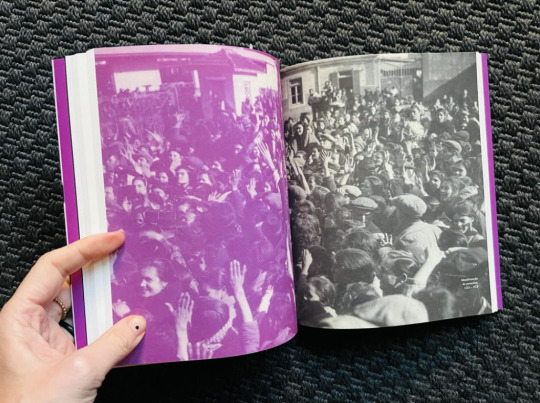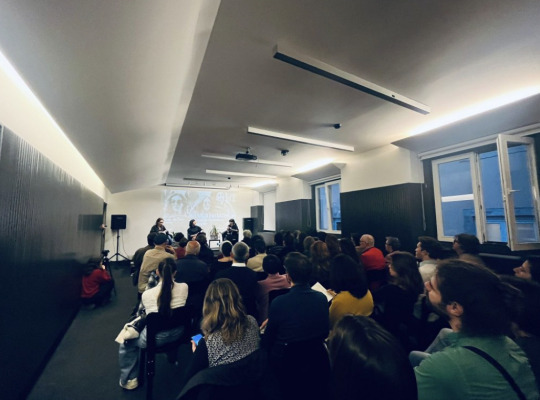#Djaimilia Pereira de Almeida
Explore tagged Tumblr posts
Text
#spotify#podcast#451 MHz#Patti Smith#Letrux#literatura#história#Paulo Werneck#Paula Carvalho#Leticia Novaes#Portuguesa#Portugal#Djaimilia Pereira de Almeida#Luanda Lisboa Paraiso
1 note
·
View note
Text
AS «NOVAS CARTAS PORTUGUESAS» E A LUTA DAS MULHERES CONTRA A DITADURA

Mulheres e Resistência, inclui textos originais de Djaimilia Pereira de Almeida e Maria do Rosário.
Foi comovente participar da apresentação de “Mulheres e Resistência”, livro que materializa parte da exposição organizada pela Rita Rato e pela Joana Alves no museu do Aljube em 2021. Esta publicação conta com vários excertos de depoimentos de mulheres que fizeram parte da luta revolucionária a vários níveis, mas que ficaram invizibilizadas, entre elas, destaco o depoimento da Faustina Barradas na sessão de apresentação. Faustina nasceu no campo, desde pequena fez parte da luta contra o regime fascista, levando jornais proibidos e mensagens cifradas no seu avental. Mãe de três filhas, viveu na clandestinidade durante vários anos até ao 25 de abril. Uma das resistentes mulheres que fazem parte deste livro e da revolução.

Apresentação do livro com participação da Tinta-da-China, Rita Rato e Luísa Sequeira
O livro Novas Cartas Portuguesas foi publicado há mais de 50 anos, em 1972. Três dias depois do lançamento, a primeira edição foi recolhida e destruída pela censura, dando origem ao processo das «Três Marias» e a uma muito significativa vitória literária e política.
0 notes
Photo

Cover Art | That Hair by Djaimilia Pereira de Almeida
“The story of my curly hair,” says Mila, the narrator of Djaimilia Pereira de Almeida’s autobiographically inspired tragicomedy, “intersects with the story of at least two countries and, by extension, the indirect story of the relations among several continents: a geopolitics.”
Mila is the Luanda-born daughter of a black Angolan mother and a white Portuguese father. She arrives in Lisbon at the tender age of three, and feels like an outsider from the jump. Through the lens of young Mila’s indomitably curly hair, her story interweaves memories of childhood and adolescence, family lore spanning four generations, and present-day reflections on the internal and external tensions of a European and African identity.
In layered, intricately constructed prose, That Hair enriches and deepens a global conversation, challenging in necessary ways our understanding of racism, feminism, and the double inheritance of colonialism, not yet fifty years removed from Angola’s independence. It’s the story of coming of age as a black woman in a nation at the edge of Europe that is also rapidly changing, of being considered an outsider in one’s own country, and the impossibility of “returning” to a homeland one doesn’t in fact know.
Release date | Mar 17, 2020 Goodreads
#that hair#esse cabelo#djaimilia pereira de almeida#eric m. b. becker#autobiography#black hair#natural hair#book cover art#book cover reveal#black authors#women authors#books in translation#booklr#bookblr
19 notes
·
View notes
Link
Los Angeles Review of Books: The Story Is Her Ancestors: On Djaimilia Pereira de Almeida’s “That Hair”
#anita felicelli#djaimilia pereira de almeida#larb#eric m. b. becker#tin house books#angolan#portuguese#womenintranslation
1 note
·
View note
Text
Literarische Abenteuer – Fegefeuer und Blütenstaub. Djaimilia Pereira de Almeida: „Im Auge der Pflanzen“.
Literarische Abenteuer – Fegefeuer und Blütenstaub. Djaimilia Pereira de Almeida: „Im Auge der Pflanzen“.
Literarische Abenteuer – Fegefeuer und Blütenstaub. Djaimilia Pereira de Almeida: „Im Auge der Pflanzen“. https://literaturradiohoerbahn.com/wp-content/uploads/2022/08/LA-Im-Auge-der-Pflanzen-DE-ALMEIDA-upload.mp3 (Hördauer 10 Minuten) Die angolanisch-portugiesische Literaturwissenschaftlerin, Essayistin, Kolumnistin und Romancière Djaimilia Pereira de Almeida wurde mit mehreren wichtigen…

View On WordPress
#Djaimilia Pereira de Almeida#Fegefeuer und Blütenstaub#Im Auge der Pflanzen#Literarische Abenteuer#Rezension#Sandra Falke#Unionsverlag#Uwe Kullnick
0 notes
Photo

Djaimilia Pereira de Almeida, Maremoto, 2021
https://www.djaimilia.com/
1 note
·
View note
Link
That Hair by Djaimilia Pereira de Almeida https://amzn.to/2U9WWVf
0 notes
Text
Books about Angola 🇦🇴

Master book list for the YA World Challenge for 🇦🇴 Angola
Coming-of-Age Good Morning, Comrades, Ondjaki 💚 Nzinga African Warrior Queen, Moses L. Howard ⌛
Middle Grade Nzingha: Warrior Queen of Matamba, Patrick C McKissack ⌛
Memoir That Hair, Djaimilia Pereira de Almeida 💚🛩️
Adult Authors to Consider Ondjaki José Eduardo Agualusa
💚 Native Author 🛩️ Immigrant or diaspora 🏖️ non-native characters in or about the country (ex. vacation/adventure) ⌛ Historical 🦋 Fantasy 🌈 LGBT
33 notes
·
View notes
Text
🇦🇴 Angola
Region: Southwest Africa
Good Morning Comrades
Author: Ondjaki

167 pages, published 2003
Original language: Portuguese
Native author? Yes
Age: 12-year-old narrator, adult book
Blurb:
Luanda, Angola, 1990. Ndalu is a normal twelve-year old boy in an extraordinary time and place. Like his friends, he enjoys laughing at his teachers, avoiding homework and telling tall tales. But Ndalu's teachers are Cuban, his homework assignments include writing essays on the role of the workers and peasants, and the tall tales he and his friends tell are about a criminal gang called Empty Crate which specializes in attacking schools.
Ndalu is mystified by the family servant, Comrade Antonio, who thinks that Angola worked better when it was a colony of Portugal, and by his Aunt Dada, who lives in Portugal and doesn't know what a ration card is. In a charming voice that is completely original, Good Morning Comrades tells the story of a group of friends who create a perfect childhood in a revolutionary socialist country fighting a bitter war. But the world is changing around these children, and like all childhood's Ndalu's cannot last.
Other reps:
Genres: #colonialism #communism #historical, 20th century #school #revolution
My thoughts:
Okay, Angola was a tough one. It was a tie between this book, or Djaimilia Pereira de Almeida’s That Hair, both of which seem to be written in a somewhat difficult stream-of-consciousness style, although both are relatively short at less than 200 pages. Neither are quite YA (although you could try for Nzinga: Warrior Queen of Matamba - a middle grade fictionalized history book, but seems to be difficult to find without purchasing a physical copy)
In any case, Good Morning Comrades will certainly be a glimpse at a region I know nothing about.
Review to come.
Kindle link
#angola#world books#ya world challenge#africa#colonialism#communism#historical 20th century#school#revolution
3 notes
·
View notes
Text
30/07/2022
Saturday afternoon we go to the City Park with the babies. On the way back we stop at Largo das Baianas, in Amaralina. The late afternoon invites to a beer in the beach hut, but the babies are restless. I go to the bathroom and snort a raya. New mood in the heart. In the evening I summoned Mano, who always helpful and efficient, deposits one more in my mailbox. I buy some beers by an internet app and take some shots of a cachaça called “Serra das Almas”, Montain of Souls. Again I left a little of my dust, maybe more than a half. This time I threw it away. I put the white powder in the palm of my hand, which almost filled it. I rubbed it and threw it in the trash. A strange ritual: tear money and health, throw away the tranquility. But it’s as if my children give me an extra dose of joy, able to counteract the depression caused by cocaine. Dad, I don’t feel so attached to it, as it may seem in these letters. Sometimes I feel like I’m testing the limits. What limits? What have my lord given me, what have you, just you, given me? After all, it is a foolish vice and I do not know if you are you or a lord. A fleeting pleasure that is no longer even so interesting, except in the first moment associated with alcohol. Everything then becomes anxiety, sterile agitation, anguish. And the next day depression, bed and wasted time. Dad, I know that this is a form of alienation that keeps me away from the people I like, keeps me away from the books I like, my coffee, my solar mornings. You must think that this is related to lack of religion. But this is foolish. I’ve been drawn to this shadow, to this dark and lonely place since I was a godly boy. I cast myself in these shadows that I cast myself as if in search of another me. What dwells in it that seduces me? I snort another raya. I open the computer and find the text, "Saudades de casa", by the Angolan writer Djaimilia Pereira de Almeida, about the effects of being in "a strange place", of the reflexive possibility of displacement, of what takes us away from insurance, from the family.
"In a not-metaphorical sense, however, the foreigner can really give us back an image of us that is not familiar to us" (Almeida)
The foreigner is no place. It can be a time, the present time and its relation to a past considered familiar and secure. It is still a form of displacement:
"being homesick is sometimes a way of understanding something about our home. The longing we feel for a time in our lives - the stillness of the decades when no one fell ill or died, and everyone got married and went on vacation - sometimes accompany the flowering of a point of view about that time. A decade can be the home we miss. And the life that follows, a prolonged stay abroad" (Almeida).
Maybe I should go back to therapy. I think about talking to M. about my addiction. But is it really a dependency? I do the math: 100 dollar spent in the month of July with this shit. Oh, this rip money and life. Half a minimum wage, I could buy books, I could pay an installment, I could buy a phonograph in about three months, I could make a trip, I could pay a pension plan for my children, I could run the half marathon, I could publish books, would give to write a book that what you want most. Maybe that’s it: cocaine frees you from all your desires. And I quickly reread Djaimilia’s essay. The ideas begin to fade in my head. I smack one raya, the last one at this night, and I go to bed.
1 note
·
View note
Photo

Esse cabelo (Djaimilia Pereira de Almeida)
https://goo.gl/PtDLA7 [mobi]
0 notes
Text
Portuguese author Djaimilia Pereira de Almeida shares suggestions for reading your way through Lisbon | The New York Times
Portuguese author Djaimilia Pereira de Almeida shares suggestions for reading your way through Lisbon | The New York Times
Pessoa and Saramago of course make the list, but there are plenty of other writers and poets here for all you readers out there…READ MORE

View On WordPress
0 notes
Text
Djaimilia Pereira de Almeida é uma escritora portuguesa nascida em Angola. Cresceu em Portugal, nos arredores de Lisboa. Considerada representante de uma literatura sobre raça, gênero e identidade, ganhou notoriedade a partir da publicação em 2015 do seu primeiro romance, a auto ficção Esse Cabelo.

0 notes
Audio
"Kalaf Epalanga pôs por escrito os lugares e as figuras da noite lisboeta abrindo as portas da noite escura de um africano em Lisboa. Para entrar, sem ser preciso contar com o humor do porteiro. E sair de olhos abertos." Djaimilia Pereira de Almeida
#tambem os brancos sabem dancar#kalaf epalanga#editorial caminho#todavia livros#kuduro#global club music#buraka som sistema#fiction#african literature#literature#auto fiction#music biography#novel#spotify#spotify playlist
5 notes
·
View notes
Link
Dear Friends, Please join us at 8:00 pm on Friday 7/26 at Molasses Books in Bushwick for our summertime installment of Us&Them. This time around, we're excited to be hosting Gregory Pardlo reading translations of Niels Lyngsø (Denmark), Kaitlin Rees reading translations of Nhã Thuyên (Vietnam), Eric Becker reading translations of Djaimilia Pereira de Almeida (Angola), and Esther Kim reading translations of Choi Eunyoung (South Korea). Please help spread the word by sharing our flyer or our facebook event page.
#us and them#molasses books#gregory pardlo#kaitlin rees#eric becker#esther kim#nhã thuyên#djaimilia pereira de almeida#choi eunyoung
1 note
·
View note
Video
youtube
S05E52: A visão das plantas, Djaimilia Pereira de Almeida
0 notes